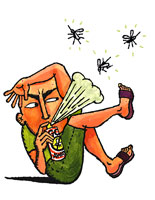Officials record 15th case of local chikungunya
 CNS): Throughout 2014 over 90 people living in Cayman have contracted the mosquito-transmitted chikungunya virus, with most of them picking up the illness in regional countries. Public health officials said they received two more positive test results for the virus from the Caribbean Public Health Agency (CARPHA) over the period 9-20 December. While one had been to Cuba, the other had no travel history and had acquired the virus locally, bringing the total number of local transmissions to 15 cases. Dr Kiran Kumar, the medical officer of health, said that cases are declining here and around the region but urged people to still take precautions against mosquito bites and help prevent their breeding.
CNS): Throughout 2014 over 90 people living in Cayman have contracted the mosquito-transmitted chikungunya virus, with most of them picking up the illness in regional countries. Public health officials said they received two more positive test results for the virus from the Caribbean Public Health Agency (CARPHA) over the period 9-20 December. While one had been to Cuba, the other had no travel history and had acquired the virus locally, bringing the total number of local transmissions to 15 cases. Dr Kiran Kumar, the medical officer of health, said that cases are declining here and around the region but urged people to still take precautions against mosquito bites and help prevent their breeding.
“In October suspected cases ranged from 20-25 per week, then fell to eight to 15 per week in November, and three to nine in December. There has also been a decrease in the number of cases reported in the region,” he explained. “Although suspected cases are on the decline and local transmission has not been aggressive, we should not be complacent. We should continue to protect ourselves from mosquito bites and to eliminate breeding sites around our properties.”
The total number of suspected cases of chikungunya reported since 25 June is 202. Fifty-six of these patients have reported travel history to countries experiencing outbreaks.
Meanwhile, the total number of laboratory-confirmed chikungunya cases in the Cayman Islands to date is 43, with an additional possible 29 people who had recently travelled to countries experiencing outbreaks. As per CARPHA guidelines, blood samples for suspected cases with travel history to endemic areas are no longer being sent for testing but are considered possible cases.
To date the total distribution of confirmed and possible cases has been 37 in George Town, 15 in West Bay, 12 in Bodden Town, 5 in Cayman Brac, 2 in Little Cayman and one in North Side.
More information can be obtained through www.hsa.ky. Regional updates can be accessed by visiting the CARPHA website.
In addition United States updates are available from the Centers for Disease Control and Prevention.
Category: Health

